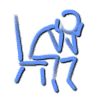|
~~Major Depressive Disorder~~
|
American Psychiatric Association (1994). Diagnostic and Statistical Manual of Mental Disordders (4th ed.) Washington, DC: American Psychiatric Assoc.
Major Depressive Disorder
is characterized by one or more Major Depressive Episodes without a history of Manic**, Mixed***, or Hypomanic* Episodes. Episodes of Substance-Induced Mood Disorder (due to the direct physiological effects of a drug of abuse, a medication, or toxin exposure) or of Mood Disorder Due to a General Medical Condition do not count toward a diagnosis of Major Depressive Disorder. In addition, the episodes must not be better accounted for by Schizoaffective Disorder and are not superimposed on Schizophrenia, Schizophreniform Disorder, Delusional Disorder, or Psychotic Disorder Not Otherwise Specificied. (p.339)
~~Major Depressive Disorder~~
A. Presence of a single Major Depressive Episode
B. The Major Depressive Episode is not bettern accounted for by Schizoaffective Disorder and is not superimposted on Schizophrenia, Schizophreniform Disorder, Delusional Disorder, or Psychotic Disorder Not Otherwise Specified.
C. These has never been a Manic Episode**, a Mixed Episode***, or a Hypomanic Episode*.
Note: This exclusion does not apply if all of the manic-like, mixed-like, or hypomanic-like episodes are substance or treatment induced or are due to the direct physiological effects of a general medication condition
     
~~Major Depressive Disorder, Recurrent~~
A. Presence of two or more Major Depressive Episodes
Note: To be considered separate episodes, there must be an interval of at least 2 consecutive months in which criteria are not met for a Major Depressive Episode.
B. The Major Depressive Episode is not bettern accounted for by Schizoaffective Disorder and is not superimposted on Schizophrenia, Schizophreniform Disorder, Delusional Disorder, or Psychotic Disorder Not Otherwise Specified.
C. These has never been a Manic Episode**, a Mixed Episode***, or a Hypomanic Episode*.
Note: This exclusion does not apply if all of the manic-like, mixed-like, or hypomanic-like episodes are substance or treatment induced or are due to the direct physiological effects of a general medication condition

Hypomanic Episode* - a distinct period during which there is an abnormally and persistently elevated, expansive, or irritable mood that lasts at least 4 days. This period of abnormal mood must be accompanied by at least three additional symptoms from a list that includes inflated self-esteem or grandiosity (nondelusional), decreased need for sleep, pressure of speech, flight of ideas, distractability, increased involvement in goal-directed activities or psychomotor agitation, and excessive involvement in pleasurable activities that have a high potential for painful consequences. (p.335)
Manic Episode** - a distinct period during which there is an abnormally and persistently elevated, expansive, or irritable mood. This period of abnormal mood must last at least 1 week (or less if hospitalization is required). The mood disturbance must be accompanied by at least 3 additional symptoms from a list that includes inflated self-esteem or grandiosity, decreased need for sleep, pressure of speech, flight of ideas, distractibility, increased involvement in goal-directed activities or psychomotor agitation, and excessive involvement in pleasurable activities with a high potential for painful consequences. (p.328)
Mixed Episode*** - a period of time (lasting at least 1 week) in which the criteria are met both for a Manic Episode and for a Major Depressive Episode nearly every day. The individual experiences rapidly alternating moods (sadness, irritability, euphoria) accompanied by symptoms of a Manic Episode and a Major Depressive Episode. The symptom presentation frequently includes agitation, insomnia, appetite dysregulation, psychotic features, and suicidal thinking. (p.333)
Major Depressive Episode**** - a period of at least 2 weeks during which there is either dperessed mood or the loss of interest or pleasure in nearly all activities. In children and adolescents, the mood may be irritable rather than sad. The individual must also epxerience at least 4 additional symptoms drawn from a list that includes changes in appetite or weight, sleep, and psychomotor activity, decreased energy; feelings of worthlessness or guilt; difficulty thinking, concentrating, or making decisions; or recurrent thoughts of death or suicidal ideation, plans or attempts.. To count toward a Major Depressive Episode, a symptom must either be newly present or must have clearly worsened compared with the person's preepisode status. (p.321)
|




